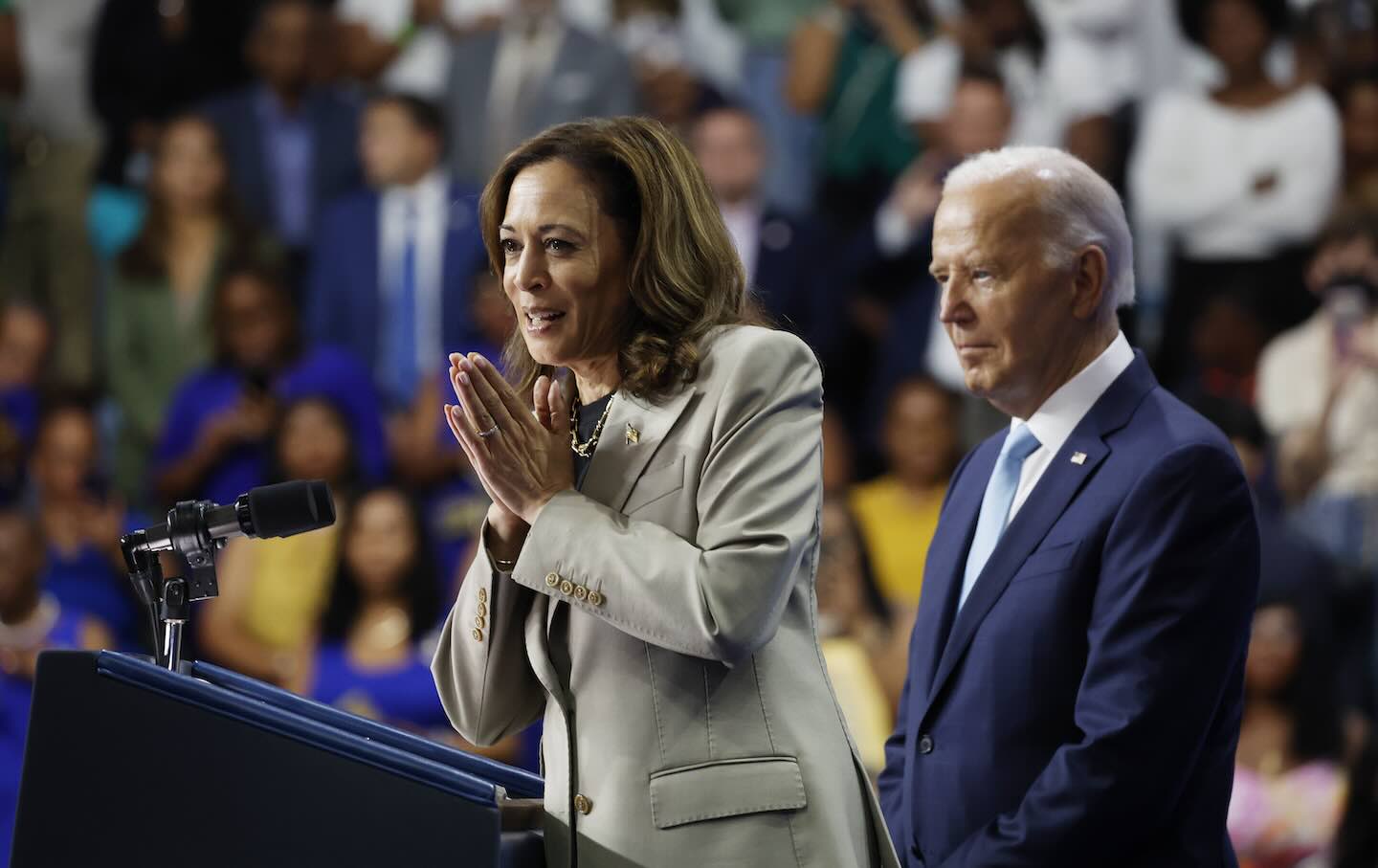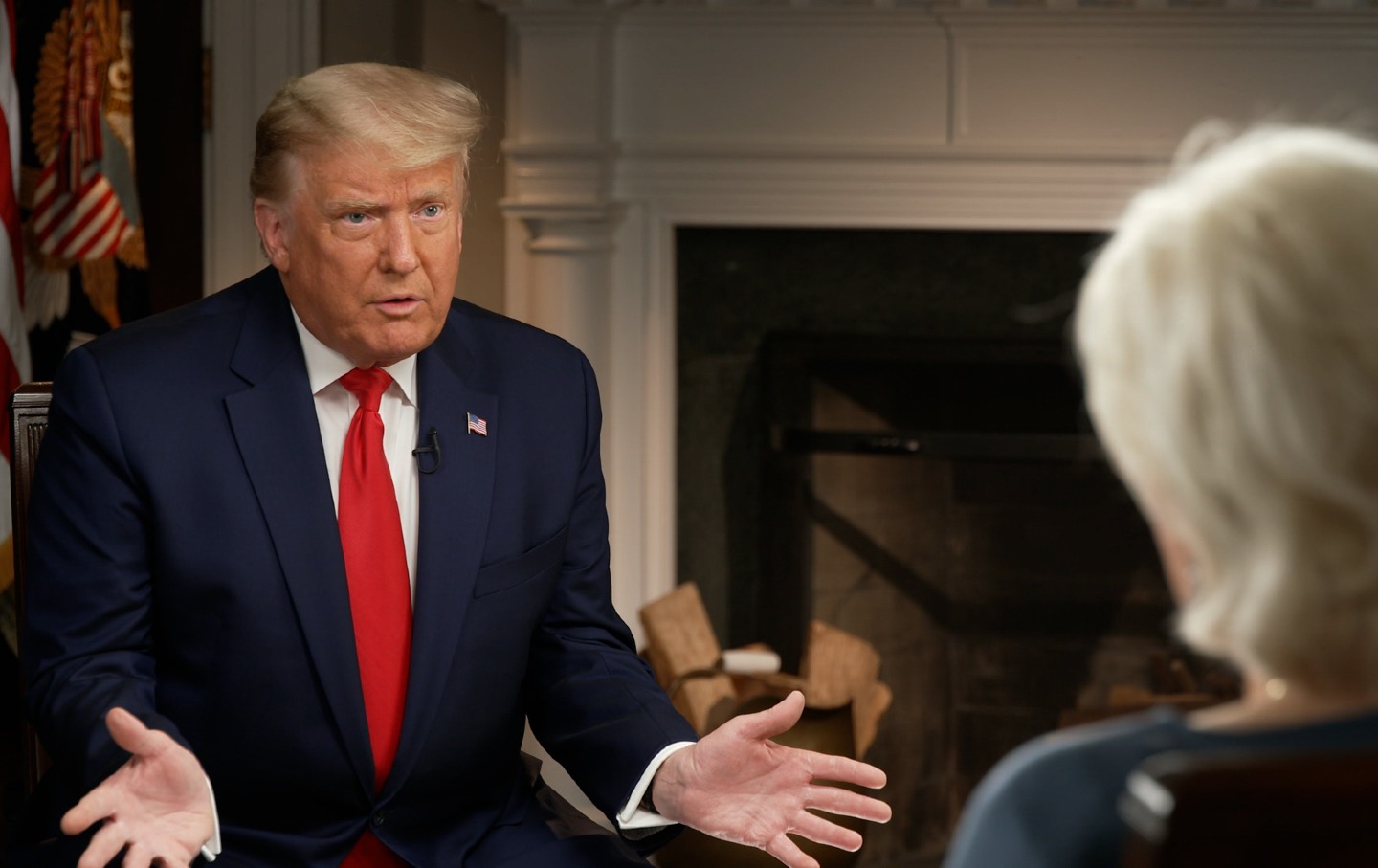Harris Must Say “No” to Wall Street and “Yes” to Lina Khan and Gary Gensler
Powerful donors want the Democratic presidential nominee to abandon the Biden administration’s commitment to regulating corporate power.

Democratic presidential nominee Kamala Harris gives remarks alongside President Joe Biden at Prince George’s Community College on August 15, 2024.
(Photo by Anna Moneymaker / Getty Images)
With two months to go until the November election, millions of Americans are still making up their minds about Vice President Kamala Harris as a potential president of the United States. Over the weekend, a New York Times poll found that Harris and Donald Trump are running neck and neck, with “28 percent of likely voters [saying] they felt they needed to know more about Ms. Harris, while only 9 percent said they needed to know more about Mr. Trump.”
That’s a big opening for the vice president. It suggests that if she delivers a clear message at Tuesday’s debate, and in the week to come, she has far more potential to pick up support than Trump. One of the most powerful of those messages has to do with the question of how she would, as president, tackle the overwhelming influence of corporations on the economic and political circumstances of the United States.
Polling, not just from this year but from the past several years, shows that Americans want elected officials to crack down on corporate abuses—especially the practices of the monopolies that control markets, jack up prices, and narrow choices for consumers. “Americans across the political spectrum are hungry for a government that stands up to corporate giants that rip them off,” says Faiz Shakir of the Fight Corporate Monopolies project. Shakir pointed to the results of an August poll that found over 80 percent of likely voters support government action to lower drug prices, investigate oil companies for price inflation, enforce right-to-repair rules, and ban noncompete agreements. “This new data demonstrates that the Biden-Harris administration’s record on cracking down on big corporations is immensely popular—voters just need to hear more about it,” adds Shakir. “That’s a good problem to have, and presents a prime opportunity for the Harris campaign to promote the many anti-monopoly policies of this administration, build upon these successful policies, and name and shame the real villains: corporate robber barons.”
The Harris campaign is clearly aware of these facts. Its “New Way Forward” policy statement, released before Tuesday’s debate, promises that
[a]s President, she will direct her Administration to crack down on anti-competitive practices that let big corporations jack up prices and undermine the competition that allows all businesses to thrive while keeping prices low for consumers. And she will go after bad actors who exploit an emergency to rip off consumers by calling for the first-ever federal ban on corporate price gouging on food and groceries, which will build on the anti-price gouging statutes already in place in 37 states.
That’s the right message.
Unfortunately, wealthy and powerful Democratic donors have begun to pressure Harris to downplay the anti-monopoly message. Worse yet, they want her to commit to getting rid of the Biden-Harris administration’s most effective corporate watchdogs and regulators. According to Bloomberg, “Major Democratic donors on Wall Street are increasingly pushing Kamala Harris’ team to replace top regulators Lina Khan and Gary Gensler if the vice president wins in November.”
Khan, a legal scholar who is internationally respected for her work on antitrust and competition law, chairs the Federal Trade Commission; while Gensler, who chaired the Commodity Futures Trading Commission and helped write the Dodd-Frank financial reform law under former President Barack Obama, now chairs Biden’s Securities and Exchange Commission (SEC). Both have earned high marks from watchdog groups and progressive leaders who have pressed for federal action to address price gouging, the lack of accountability in financial industries, and scheming by CEOs to undermine competition. Senator Elizabeth Warren, the Massachusetts Democrat who has made corporate accountability a priority throughout her career as a law professor, member of Congress, and presidential contender, has frequently hailed Khan’s emphasis on “reviving antitrust enforcement and fighting monopolies that threaten our economy, our society, and our democracy.” When Biden named Gensler to the SEC post, Warren called the regulator “a smart, strategic and bold leader who will return the SEC to the gold standard of investor protection.”
Khan and Gensler have been thoughtful regulators. They have not always been as aggressive as activists would prefer. But they have been sufficiently bold to earn the disdain of the billionaire class that relies on insider connections and soft regulation to build its wealth. According to Bloomberg, “On calls with her staff and at fundraisers, deep-pocketed donors have repeatedly named Khan, chair of the Federal Trade Commission, as impeding the technology sector and other lucrative parts of the economy, according to people familiar with the matter. The private conversations about having her replaced have intensified since public calls for her ouster in July from Barry Diller, chairman of IAC Inc., and LinkedIn Corp. co-founder Reid Hoffman, who said Khan was ‘waging war on American business.’”
Khan’s not waging war on business, and neither is Gensler—who has faced criticism from Harris-backing billionaire Mark Cuban, who wants the SEC chair fired because of the commission’s emphasis on litigation and regulation regarding crypto exchanges. Khan and Gensler are doing their jobs in the way that was intended when the agencies they head were established to take on robber barons and Wall Street speculators, under Democratic President Woodrow Wilson in the case of the SEC and Democratic President Franklin Roosevelt in the case of the FTC.
Harris should come to the defense of Khan and Gensler—as well as other key players on these issues, such as Jonathan Kanter, the assistant attorney general for the Antitrust Division at the Department of Justice. These are people she knows and has worked with as vice president. She should mount those defenses publicly, and without equivocation, in order to make it absolutely clear that, unlike Trump, she will not be swayed by donor demands. She needs to be clearly identified as the candidate who can and will say “no” to corporate special interests.
For Harris, this is the way to further define herself in the eyes of voters who are looking for a president who will take their side—just as clearly as FDR did. Summing up his first term when he was seeking reelection in 1936, FDR told a crowd at Madison Square Garden:
We had to struggle with the old enemies of peace—business and financial monopoly, speculation, reckless banking, class antagonism, sectionalism, war profiteering.
They had begun to consider the Government of the United States as a mere appendage to their own affairs. We know now that Government by organized money is just as dangerous as Government by organized mob.
Never before in all our history have these forces been so united against one candidate as they stand today. They are unanimous in their hate for me—and I welcome their hatred.
That’s the way that voters wanted Roosevelt to talk about the wealthy and powerful interests of his day. We know so because, three days after his “I welcome their hatred” address, FDR was reelected with 60.8 percent of the popular vote and 98 percent of the Electoral College. He carried every state in the nation except Maine and Vermont. The landslide secured not just his place in the record books but also an epic mandate to govern with the boldness that the moment demanded.
Kamala Harris needs a mandate of her own. The way to get it is by standing up to the dangerously wrongheaded donors who would have her abandon the appointees who have been in the forefront of the Biden-Harris administration’s commitment to crack down on Wall Street and rein in corporate power.
Hold the powerful to account by supporting The Nation
The chaos and cruelty of the Trump administration reaches new lows each week.
Trump’s catastrophic “Liberation Day” has wreaked havoc on the world economy and set up yet another constitutional crisis at home. Plainclothes officers continue to abduct university students off the streets. So-called “enemy aliens” are flown abroad to a mega prison against the orders of the courts. And Signalgate promises to be the first of many incompetence scandals that expose the brutal violence at the core of the American empire.
At a time when elite universities, powerful law firms, and influential media outlets are capitulating to Trump’s intimidation, The Nation is more determined than ever before to hold the powerful to account.
In just the last month, we’ve published reporting on how Trump outsources his mass deportation agenda to other countries, exposed the administration’s appeal to obscure laws to carry out its repressive agenda, and amplified the voices of brave student activists targeted by universities.
We also continue to tell the stories of those who fight back against Trump and Musk, whether on the streets in growing protest movements, in town halls across the country, or in critical state elections—like Wisconsin’s recent state Supreme Court race—that provide a model for resisting Trumpism and prove that Musk can’t buy our democracy.
This is the journalism that matters in 2025. But we can’t do this without you. As a reader-supported publication, we rely on the support of generous donors. Please, help make our essential independent journalism possible with a donation today.
In solidarity,
The Editors
The Nation








